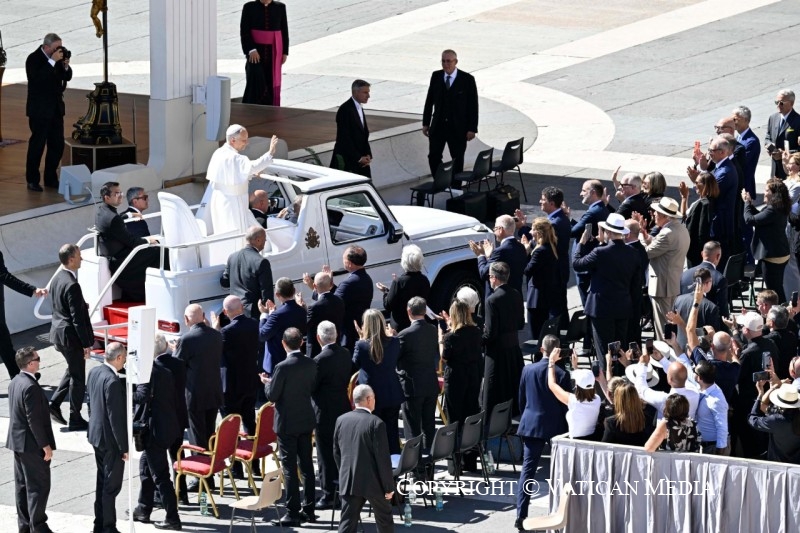Leo XIV: “Justice is concrete when it achieves equality in dignity”
Over 15,000 people gathered in St Peter's Square for the Jubilee of Justice Workers. Provost recalled that “evil must not only be punished, but repaired”. He recalled the “unjust and inhuman” conditions of peoples who “hunger and thirst for justice”.
Vatican City (AsiaNews) - Around 15,000 people gathered at noon in a sun-drenched St Peter's Square to meet Pope Leo XIV on the occasion of the Jubilee of Justice, the first initiative on this theme of a Holy Year.
Cardinal Rino Fisichella introduced the pontiff's words from the churchyard of the basilica: ‘Those who have a heart for justice [...] are here [...], confident that they will be strengthened in their responsibility to combine the interpretation of the law with justice, so that justice may truly be the basis of personal and social life.’ Before speaking, Pope Prevost greeted those present, approaching them in the popemobile and blessing the children.
As the Pope pointed out, justice is a ‘broad field.’ The people in St. Peter's Square this morning come from about 100 countries, spread across every continent. They belong to different professional categories.
‘Magistrates from all jurisdictions and fields, lawyers, deans of law faculties and university professors, notaries,’ added Fisichella. But also ‘administrative staff of courts and universities, together with their families.’ And the Jubilee is the “best” opportunity, said Prevost, to reflect on the theme of justice and its function, which is ‘indispensable both for the orderly development of society and as a cardinal virtue that inspires and guides the conscience of every man and woman.’
‘In justice, in fact, the dignity of the person, his relationship with others and the dimension of the community made up of coexistence, structures and common rules are combined,’ continued Leo XIV in his speech, emphasising that, according to tradition, it is also a virtue, ‘a firm and stable attitude that orders our conduct according to reason and faith.’
For the believer, justice pursues a goal ‘that guarantees an order that protects the weak, those who seek justice because they are victims of oppression, excluded or ignored.’ The Pope then recalled that there are numerous episodes in the Gospels ‘in which human action is evaluated by a justice capable of defeating the evil of abuse.’
The justice shown in the Gospels, however, although different, ‘does not distract from human justice, but questions and redesigns it.’ ‘It provokes it to go ever further, because it pushes it towards the search for reconciliation. Evil, in fact, must not only be punished, but repaired, and to this end, a profound gaze towards the good of people and the common good is necessary,’ said the pontiff.
This is a difficult task, but not impossible for those who, aware that they are performing a more demanding service than others, are committed to leading an irreproachable life. Justice, the “concrete” kind, must strive “towards others”, “until equality in dignity and opportunities among human beings is achieved”.
Equality before the law, however, does not eliminate ‘growing discrimination, the primary effect of which is precisely the lack of access to justice.’ True equality, on the other hand, ‘is the possibility given to all to realise their aspirations and to see the rights inherent in their dignity guaranteed,’ he said.
Today, justice practitioners - a delegation of whom from around the world was in the square today to listen to the Pope - must be inspired by ‘the search for or recovery of forgotten values in coexistence, their care and respect’. "It is precisely through the values that underpin social life that justice assumes its central role in the coexistence of people and human communities.
As St Augustine wrote: “Justice is not justice unless it is at the same time prudent, strong and temperate”,‘ he added. Justice that is also great ’in small things‘ and is recognised ’when it is applied with fidelity to the law and respect for the person wherever they may be in the world".
Leo XIV concluded his speech by referring to an “aspect of justice that is often not sufficiently focused on”. It is the painful and ever-present reality in the world of “many countries and peoples who are 'hungry and thirsty for justice” because their living conditions are so unfair and inhumane as to be unacceptable', he said.
These words were met with spontaneous applause from the square. Quoting St Augustine again, Prevost added that ‘these eternally valid judgments should therefore be applied to the current international landscape.’ That is, ‘The state, in which there is no justice, is not a state. Justice is, in fact, the virtue that distributes to each his due. Therefore, it is not the justice of man that takes man himself away from the true God.’ These words are taken from De Civitate Dei, written between 413 and 426 AD.







.png)










